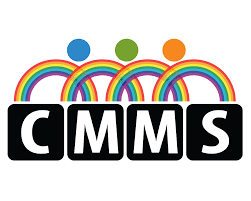PrioBaba Campaign
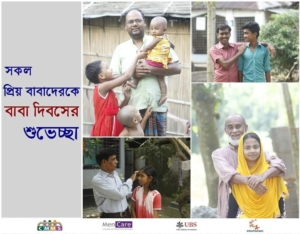
“Responsible Father, Happy Family, Prosperous Country,”
When it comes to the topic of violence within family, fathers are often placed in the role of perpetrators. Being the sole decision maker, fathers are indeed the gatekeepers for violence like child marriage. But research suggested that in most of the cases fathers think they do so for the betterment of their daughters. Does not it reveal that the fathers still have love for their children and families? Yes, they do and if can show them the brutal consequences of violence and reveal other positive ways of parenting, then they are sure to transform!
And real life stories of fathers who fought against child marriage and supported girl’s education can truly inspire others to think beyond the traditional thoughts of fatherhood and to make changes. In 2015-2017 Prio Baba Campaign celebrated the Role Model fathers and initiated self reflection among 1200 fathers from five districts to enact positive masculine practices and to stop violence at home.
The Story of Prio Baba
The initiative aimed to identify the most effective ways to involve fathers in preventing discrimination against women and girls in the household and beyond. In line with these objectives, the Prio Baba campaign conducted awareness-raising campaigns in rural areas of five districts of Bangladesh in 2015-17 involving 1200 fathers of 0-5 year’s old children. The campaign primarily worked to sensitize fathers on seven different sessions such as fatherhood, equal rights of boy and girl child, role of father and mother in daily household chores, conjugal relationship and impact on children, women’s health and pregnancy, equal participation in family planning and impact of drug addiction. This campaign also worked to develop and test community dialogue and role model initiatives engaging fathers to stop violence in their homes.
With the support of UBS Foundation allocating budget of USD $189,282.22 during 2015 – 2017, CMMS implemented “Men Care Bangladesh: Engaging Fathers for Family Well-Being” involving men to become active agents of change enacting positive fatherhood and being engaged in care works to combat violence against women and children within household. On 21 September, 2015 Center for Men and Masculinities Studies (CMMS) launched MenCare Campaign titled ‘Prio Baba’ jointly with Promundu-Us in Bangladesh. The campaign, whose motto is “Responsible Father, Happy Family, Prosperous Country,” encourages men’s involvement as equitable and non-violent fathers and partners through sensitization trainings. The Pr0o Baba campaign is part of an integrated project that works with fathers, health care providers, and communities to prevent violence against women and children in Bangladesh. By engaging fathers (and mothers as appropriate) with children ages 0-5 in a gender-transformative program called “MenCare”, Promundo and CMMS expect that children will experience and witness less violence in their homes because of their parents’ participation in MenCare’s community dialogues, group education and/or sensitization workshops. 1200 fathers and their wives were involved in the campaign from five districts named as Sirajganj, Natore, Cox’s Bazaar, Rangpur and Pabna. , Promundu-US and CMMS spend around 10,000,000 BDT (134,000USD) in 2015 -2017.
Theory of Change
Our society encourages men to be violent against women. Our customs and cultures along with social rules and regulations sustain such a situation. But a harmonious relationship is required not only for men and women but also for the development of a newer generation. If a child sees the mother being battered and tortured by the father frequently, the child would start to hate the father and would repeat the same in the future. Thus, gender-based violence transmits from generation to generation.
Now the question is, if we want to change such masculine practices and want to bring men in the role of caregiver, or protestor of gender-based violence, then how is it possible to defy the patriarchal social structure? Connell’s (1995) proposition on men and masculinity may help to answer this query that there are multiple forms of masculinities, different forms of fatherhood too. If we want to change the scenario of gender-based violence, at first we need to admit that men are not a unitary category. The traits of men are not biological constant; it is the product of different social processes. Therefore, if we want to change those, we need to consider the historical and social context. In general, it is observed that men who fail to practice the hegemonic norms or involve in care works, society rebukes and marginalizes them. As soon as we will start to recognize the multiple forms of masculinities, and identify effective ways to bring those marginalized positive men in the mainstream, men, in general, will feel encouraged practicing positive masculinity.
The theory of change is based on a hypothesis that if the younger fathers practicing hegemonic masculinities enacting traditional beliefs and practices have conversation s with the older fathers who have successfully defied such norms and enact positive masculinities will also enact embody positive masculinities.
The key aspects of the theory of change for the self reflexive dialogues are as follows:
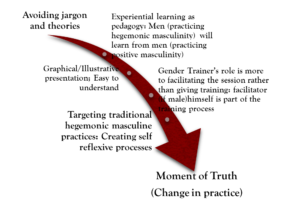
A Role model is sharing his experience on the Program P session, who has challenged the conventional concepts of women’s health during pregnancy. The session took place on May 31, 2016, pakuria sharif, dighir par, Rangpur.
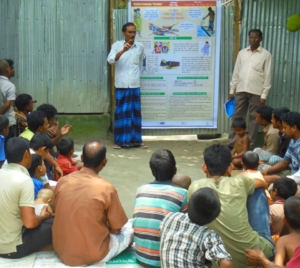
Changes through the PrioBaba Campaign
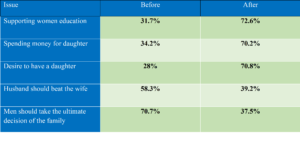
Click here to add your own text
